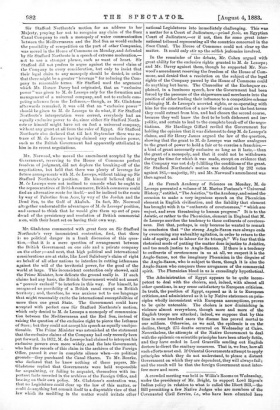Mr. Gladstone commented with great force on Sir Stafford Northcote's
very inconsistent contention, first, that there
no political danger in a frank discussion of this ques- tion,—that it is a mere question of arrangement between the British Government on one side and a private company on the other ;—and next, that high political and international considerations are at stake, like Lord Salisbury's claim of right oa behalf of all other nations to interfere in cutting isthmuses against the will of the territorial power, for the good of the world at large. This inconsistent contention only showed, said the Prime Minister, how delicate the ground really is. If such claims had any basis, the British Government would not assert a " pouvoir exclusif " to interfere in this way. For himself, he recognised no possibility of a British canal except on British territory ; and, therefore, he was anxious not to use language that might reasonably excite the international susceptibilities of more than one great State. The Government could have accepted with perfect ease Sir Stafford Northcote's motion, which only denied to M. de Lesseps a monopoly of communica- tion between the Mediterranean and the Red Sea, instead of raising the question of the exclusive right to pierce the Isthmus of Suez ; but they could not accept his speech as equally unobjec- tionable. The Prime Minister was astonished at the statement that the exclusive claims of the Company had only recently been put forward. In 1872, M. de Lesseps had claimed to interpret his exclusive powers even more widely, and the late Government, who had the records of this claim in the archives of the Foreign Office, passed it over in complete silence when—on political grounds—they purchased the Canal Shares. To Mr. Bourke, who declared that he knew nothing of these papers, Mr. Gladstone replied that Governments were held responsible for acquainting, or failing to acquaint, themselves with im- portant facts recorded in the archives of the Foreign Office, and beating on their own policy. Mr. Gladstone's contention was, that no Legislature could clear up the law of this matter, or could do and thing but commit itself to a disputable view of that law which its meddling in the matter would irritate other national Legislatures into immediately challenging. This was a matter for a Court of Jndicature,—prima facie, an Egyptian Court of Judicature,—or if not, then for some great inter- national tribunal representing all the countries concerned in the Suez Canal. The House of Commons could not clear up the matter. It could only stir up the selfish jealousies involved.


































 Previous page
Previous page